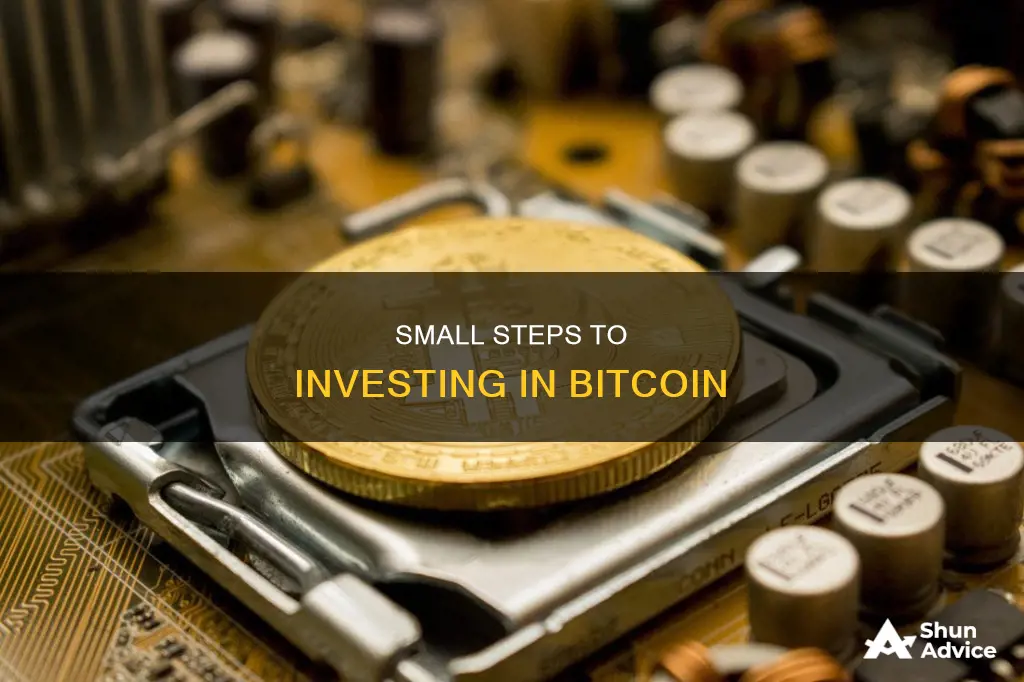
Bitcoin is a popular type of cryptocurrency that utilizes a large chain of interconnected computers to store and protect your digital assets. It is a highly volatile asset prone to large and fast swings in value, which presents an opportunity for large returns but also poses tremendous risk.
If you are looking to make a small investment in Bitcoin, there are several ways to do so. Here are some of the most common methods:
- Cryptocurrency Exchanges: You can purchase bitcoin from cryptocurrency exchanges such as Coinbase, Gemini, Kraken, Crypto.com, and Binance. These exchanges allow you to buy and sell Bitcoin and other cryptocurrencies.
- Traditional Stockbrokers: Some traditional brokers, such as Robinhood, Webull, TradeStation, and Fidelity, offer their customers a way to buy and sell Bitcoin.
- Money Transfer Apps: Cash transfer services like PayPal, Venmo, or Cash App allow users to purchase, store, send, and sell Bitcoin directly through their apps.
- Bitcoin ATMs: Bitcoin ATMs act like in-person bitcoin exchanges, where individuals can insert cash to purchase bitcoin, which is then transferred to online wallets.
- Bitcoin Exchange-Traded Funds (ETFs): Bitcoin ETFs provide a way to invest in Bitcoin through a regulated stock market environment. These ETFs can be traded on exchanges such as Cboe Australia (CXA) or the Australian Securities Exchange (ASX).
It is important to note that investing in Bitcoin carries inherent risks, and you should carefully consider your financial situation, risk tolerance, and investment goals before making any decisions.
| Characteristics | Values |
|---|---|
| Investment Amount | As little as $25 |
| Investment Options | Direct purchase, exchange-traded funds (ETFs), crypto-related stocks, Bitcoin mining |
| Investment Risks | High volatility, regulatory uncertainty, security risks, pump-and-dump schemes |
| Investment Returns | Potential for high returns, e.g. 11,900% increase in Bitcoin's value from May 2016 to May 2024 |
| Investment Timeframe | Long-term investment, short-term trading |
| Investment Platforms | Coinbase, Binance, Kraken, Gemini, Robinhood, SoFi, etc. |
| Payment Methods | Bank transfer, credit card, debit card, PayPal |
What You'll Learn

How to buy Bitcoin
Step 1: Choose a Crypto-Trading Service or Venue
You can buy bitcoin through a crypto-trading service or venue, such as a cryptocurrency exchange or a traditional stockbroker. Some popular cryptocurrency exchanges include Coinbase, Kraken, Gemini, and Binance. Robinhood was the first mainstream investment broker to offer Bitcoin.
Step 2: Connect Your Exchange to a Payment Option
Once you've chosen a crypto-trading service or venue, you'll need to connect it to a payment option. This could be your bank account, debit card, or credit card. Keep in mind that credit card companies often treat crypto purchases as cash advances, which can result in higher interest rates and extra fees.
Step 3: Place an Order
When you're ready to buy, simply place an order through your chosen crypto-trading service or venue. You can usually buy fractions of a single coin, so you don't need to purchase a whole Bitcoin.
Step 4: Safe Storage
After buying Bitcoin, it's important to store it securely. You can use a hot wallet, which is connected to the internet, or a cold wallet, which is offline and provides greater security. Examples of hot wallets include Electrum and Mycelium, while cold wallets often take the form of hardware similar to a USB drive.
Best Coinbase Investments: Where to Put Your Money
You may want to see also

How to store Bitcoin
Bitcoin can be stored in two kinds of digital wallets: a hot wallet or a cold wallet. With a hot wallet, transactions are generally faster, but security is weaker. Cold wallets, on the other hand, often incorporate extra security steps that help to keep your assets safe but also make transactions take longer.
Hot Wallets
Hot wallets are apps on devices such as computers, phones, or tablets. These wallets generate the private keys to your coins on internet-connected devices. They are convenient because you can access your coins through the internet or a software program. However, hot wallets are vulnerable to hacking, and if the provider is hacked, your coin information may be at risk. Examples of hot wallets include Electrum and Mycelium.
Cold Wallets
Cold wallets are small, encrypted portable devices that allow you to download and carry your Bitcoin. They are considered much more secure than hot wallets. Cold wallets are not connected to the internet and are, therefore, less likely to be compromised. They can cost anywhere from $60 to $200. Examples of cold wallets include Ledger, Trezor, and Coldcard.
Other Options
Desktop wallets are programs that reside on your computer, while mobile wallets are hosted on mobile devices. These options are not considered very secure. Another option is a web-based wallet, which is hosted by a web service. However, this is also not secure, as you are letting someone else store your keys for you.
Best Practices for Storing Bitcoin
Regardless of the type of wallet you choose, there are some best practices to follow to ensure the security of your Bitcoin:
- Use a strong password and two-factor authentication.
- Back up your wallet early and often, and store the backup in multiple secure locations.
- Keep your software up to date to patch security vulnerabilities.
- Consider using a multi-signature wallet, which requires multiple people to approve transactions.
- Keep your seed phrase secure. This is a series of randomly generated words that act as a master password for your wallet.
The Ultimate Guide to Investing in Coin Market Cap
You may want to see also

How much to invest in Bitcoin
Overview
Bitcoin is a very high-risk investment. It is a volatile asset, meaning its value can rise or fall dramatically in a very short period. For example, in March 2024, Bitcoin hit record highs after a lengthy price slump. As such, investing in Bitcoin should be done with caution and careful consideration.
How Much to Invest
It is recommended that you do not invest more than you can afford to lose. Most financial experts advise that you limit your exposure to crypto to less than 5% of your total portfolio. If you are new to crypto investing, you may want to start with 1% to 2%.
You can start investing in Bitcoin with a small amount of money. Many crypto exchanges have minimum purchases of $10 or less, and you can buy fractions of a single coin. Your initial investment could be as low as $25.
Factors to Consider
When deciding how much to invest in Bitcoin, consider your risk tolerance, investment strategy, and financial goals. Bitcoin is not backed by any physical asset, like gold or silver, and there is no central regulator ensuring stable value. Its value is dependent on market demand.
If you are going to be trading large amounts of Bitcoin, it is recommended to use a cold wallet to store your coins. A cold wallet is a small, encrypted portable device that is considered much more secure than a hot wallet, which is operated by a cryptocurrency exchange or provider. Cold wallets typically cost between $60 to $100.
Tips for Investing in Bitcoin
- Understand your risk tolerance: Bitcoin is a high-risk investment. Carefully review your risk tolerance before investing, and consider other options if you are uncomfortable or only have a small amount to invest.
- Diversify your portfolio: Protect yourself from investment losses by diversifying your portfolio. Your primary investments should be low-risk, followed by medium-risk, and then high-risk.
- Start small: If you are unsure, begin with a small amount that you are comfortable with. You can always invest more later.
A Beginner's Guide to Investing in Bitcoin in India
You may want to see also

Risks of investing in Bitcoin
Investing in Bitcoin and other cryptocurrencies can be risky due to the many uncertainties surrounding the newness of this technology and the lack of regulation in the market. Here are some of the critical risks associated with investing in Bitcoin:
Volatile and Fluctuating Market
The price of Bitcoin is highly volatile and constantly fluctuating. Its value is unpredictable and subject to significant swings due to various factors, including sentiment, speculation, and market manipulation. This volatility makes it challenging for investors to build confidence and secure gains. The unpredictable nature of the market means there is no guarantee of a return on investment, and investors must be vigilant to avoid massive losses.
Cyber-Security Risks and Fraud
Bitcoin and other cryptocurrencies are vulnerable to cyber-attacks and fraudulent activities due to their technology-dependent nature. Hacking, phishing, and other malicious activities pose serious threats to investors. If an investor loses their private key or it is compromised, they may lose access to their Bitcoin wallet, resulting in a complete loss. Additionally, exchanges and mining losses are common, and there is rarely a way to retrieve stolen or lost bitcoins. The lack of security and the susceptibility to cyber threats create significant risks for investors.
Little or No Regulation
The Bitcoin market currently operates with little to no major regulations. The lack of clear government stances and taxation policies on cryptocurrency creates uncertainty for investors. The absence of taxation could also lead to problems if Bitcoin competes with government-issued currency in the future. The regulatory landscape is evolving, and there is a possibility of future restrictions or even bans on cryptocurrencies, which could significantly impact their value.
Technology Reliance and Digital Security
Bitcoin is entirely reliant on technology, and any issues with the underlying technology can affect its value. As a digital currency, Bitcoin is susceptible to cyber threats, online fraud, and system failures. Unlike traditional investments, Bitcoin has no physical collateral. This lack of tangible backing makes Bitcoin investors more vulnerable to losses in the event of technological failures or cyber-attacks.
Loss of Confidence in Digital Currencies
Bitcoin and other cryptocurrencies are part of a new and rapidly evolving industry. The value of these currencies is based solely on market participants' perceived value, and a loss of confidence could lead to a collapse in trading activities and an abrupt drop in value. The uncertainty surrounding the acceptance and regulation of cryptocurrencies means there is a chance this asset class may never be broadly adopted, resulting in a complete loss of value.
Litecoin in India: Worth Investing?
You may want to see also

How to sell Bitcoin
There are several ways to sell Bitcoin, each with its own unique processes and considerations. Here are some of the most common methods:
- Bitcoin Wallet Apps: You can use a self-custodial Bitcoin wallet app, such as the Bitcoin.com Wallet app, to sell your Bitcoin. This usually involves importing your Bitcoin, connecting your bank account, and following the instructions to sell.
- Bitcoin Exchange Services: Cryptocurrency exchanges like Coinbase, Binance, and Kraken provide an easy and convenient way to sell Bitcoin. You'll need to set up an account, verify your identity, and place a sell order stating the amount and asking price. The exchange will automatically complete the transaction when someone matches your offer.
- Centralized Exchanges (CEXs): These platforms allow you to sell Bitcoin and offer various features and trading options. However, they may have restrictions based on your country and typically charge withdrawal fees.
- Bitcoin ATMs: Bitcoin ATMs provide immediate access to cash in exchange for your Bitcoin. You'll need to scan your wallet QR code and follow the instructions to sell your Bitcoin for cash. However, they usually charge high transaction fees, and not all ATMs offer both buying and selling options.
- Peer-to-Peer (P2P) Trading: You can sell Bitcoin directly to another person through online platforms or in-person meetings. Online P2P platforms, such as Binance P2P and Paxful, facilitate these transactions and often provide escrow functions for added security.
- Using a Brokerage: You can sell Bitcoin through a brokerage service, such as eToro. This method may involve creating an account and connecting it to your bank account.
When choosing a method to sell Bitcoin, consider factors such as convenience, control over funds, transaction fees, and anonymity. Additionally, always be mindful of the tax implications and potential capital gains when selling any asset, including cryptocurrency.
Dogecoin: Which Companies Are Investing?
You may want to see also
Frequently asked questions
The minimum investment amount depends on the platform you choose to invest in. Some platforms allow you to invest as little as $10 or even less. You can also invest in fractions of a single Bitcoin, so your initial investment could be as low as $25.
Bitcoin is a very high-risk investment due to its volatile nature. Its value may rise or fall dramatically in a short period, and it's not backed by any physical asset or central regulator. There's also a risk of fraud or hacking, as well as the possibility of falling victim to a "pump-and-dump" scheme.
The main benefit of investing in Bitcoin is the potential for high returns. If you invest a large amount and capitalise on a market surge, you could generate a huge profit. Bitcoin also offers liquidity, and some experts compare it to gold due to its finite supply and purchasing power.
You can buy Bitcoin through a cryptocurrency exchange or broker, such as Coinbase, Binance, Kraken, or Robinhood. You'll need to create an account, provide personal information, and fund your account before placing your order.
You can store your Bitcoin in a digital wallet, either a "hot wallet" or a "cold wallet". A hot wallet is connected to the internet and is more convenient, but less secure. A cold wallet is an offline storage device, similar to a USB drive, which provides greater security.







